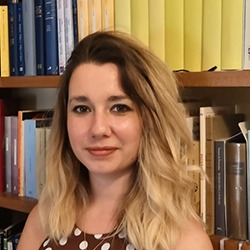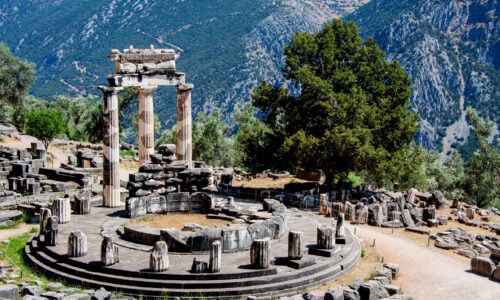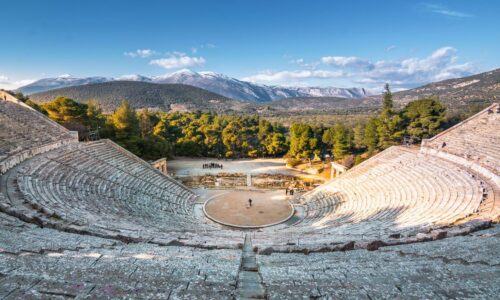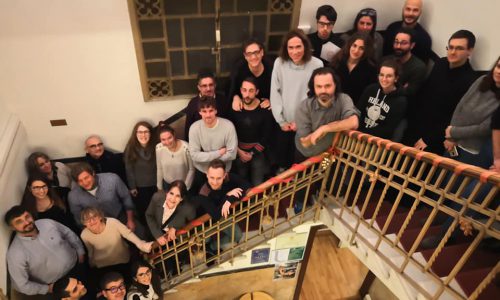Ancient Greek
- Home
- Courses
- Ancient Greek
- Ancient Greek 1
Ancient Greek 1
Greece will never cease to captivate with the tale of its soul: all it takes is learning to listen to its ancient voice to find it in the lexicon of science, in the thoughts of philosophy, and in the life of politics. From the basics of Ancient Greek to literary texts, you learn to follow the path of ancient Greek sounds to reach their words, delving into the lexicon and the fundamentals of Greek grammar. This is the course that makes the incredible a reality: speaking Ancient Greek to learn to read the Greek texts that are the foundation of Western civilization!
Overview
Admission
No admission test is required for the first year. The only prerequisite is the knowledge of the Ancient Greek alphabet.
Objectives
- Understanding of an Ancient Greek text, without using the dictionary
- In-depth knowledge and active use of all the most fundamental structures of Greek syntax and grammar
- Knowledge of the 1500 most frequent words in Greek classical literature
- Ability to write and speak in Ancient Greek
Program
Through the reading of texts in Ancient Greek, which are designed to encourage language learning, students deal with literary classical Greek (Attic Greek, V century b.C.) morphology, syntax and phraseology. Lessons will be held completely in Ancient Greek: following the fundamentals of the inductive-contextual methodology, the active use of Greek language both by the students and the teacher turns passive learning into an active competence, thus ensuring a sound knowledge of the language. Readings of some original Latin texts complete the course program. View the program in details
The course will be held in person. Those who wish to attend the course online, may attend the course Ancient Greek 1 Online.
CONTINUE STUDYING WITH US
Upon the completion of the course, students who have attended at lest the 75% of class hours, may access the course of Ancient Greek 2 or Ancient Greek 2 – Telematic.
It is of the utmost importance that students have their textbooks since the first day of classes.
1. M. Balme – G. Lawall – J. Morwood, Athenaze, Book I: An Introduction to Ancient Greek, Revised Third Edition, Oxford University Press
2. M. Balme – G. Lawall – J. Morwoodi, Athenaze, Workbook I: An Introduction to Ancient Greek, Revised Third Edition, Oxford University Press
3. Excerpts (provided by the instructor) from C. W. E. Peckett, A. R. Munday, Thrasymachus, Bloomsbury Publishing Plc
4. Excerpts (provided by the instructor) of Greek classics, including passages from Homer, Aeschylus, Thucydides and others
Recommended readings (the following texts are not required for the exam, but are recommended for those who wish to strengthen their knowledge):
1. W. H. D. Rouse, A Greek boy at home, Blackie & Son (see the link)
2. E. Minguzzi, Imparare il greco. Grammatica e lessico di base, Cortina
3. G. Cauquil – J. Y. Guillaumin, Lessico essenziale di greco (a cura di F. Piazzi), Cappelli
4. P. Saffire – C. Freis, Ancient Greek alive, University of North Carolina
– Students who have attended at least 75% of class hours may obtain a course completion certificate.
– Those who wish to obtain university certifications (6 CFU/ECTS) should pass the final exam with an evaluation fo at least 18/30. The exam will consist in a written test structured as follows: (a) grammatical competences, (b) comprehension of a written text, (c) production of a written text.
In virtue of an agreement between the Italian Institute of Classical Studies (IISC) and the Faculty of Classics of the Salesian Pontifical University (UPS) – whose titles are recognized by Italy – the ECTS issued at the IISC are automatically recognized for the student enrolled at the UPS and they are recognizable at the Italian Universities (without prejudice to the discretion granted to the universities by the Italian law).
The course is also recognized by the MIUR – Regional School Office for Lazio as valid for the professional training of teaching staff.
First lesson
Last lesson
No class days
2026 January, 1
2026 January, 8
2026 April, 2
DIDACTICAL FIELD-TRIPS
2) Tarquinia (VT): from Sat 2026 May, 23 (3:00 p.m.) to Sun May, 24 (7:00 p.m.)
Exam sessions
2026 July, 16
2026 September, 17
First lesson
Last lesson
No class days
2024 December, 30
2025 January, 6
2025 April, 21
2025 April, 28
DIDACTICAL FIELD-TRIPS
Gaeta (LT): overnight stay from Sat May 24 (2:00 pm) to Sun May, 25 (7:30 pm)
Exam sessions
2025 June, 16
2025 September, 15
Instructor
Flavia Farina teaches Philosophy and Theory of Action in the Antiquity at the Roma Tre University.
She was visiting scholar in Philosophy at the Oxford University. She was a Post-Doc research fellow for the PRIN Project “Ethics and Technology“. She earned, with honors, a PhD in Ancient Philosophy (Roma Tre – Tor Vergata / Sorbonne Université). She graduated with honors in Philosophical Sciences (Roma Tre University).
She has written papers both in national and international journals, such as “Degrees of Culpability and Voluntary Actions” (Elenchos), “Gli eph’hemin e l’unidirezionalità degli abiti – una conciliazione possibile tra le Etiche di Aristotele” (Méthexis), “Aristotle on (second) nature, habit and character” (R. Chiaradonna, F. Farina – Routledge).
She mainly deals with Aristotle, ancient ethics and Hellenistic Greek.
You May Like
Ancient Greek Conversation and Composition 1
- Dates and times: Thursday 4:45-5:30 pm (November-May)
- Teaching method: in presence and online (live streaming)
Admission The only prerequisite is the knowledge of the Ancient Greek alphabet. The course is strongly recommended to the students …
Ancient Greek 1 – Online
- Dates and times: Wednesday 6:00 - 7:30 pm (October-May)
- Teaching method: online (live streaming)
Wherever you are and at any time, you can always find a bit of the Ancient Greeks in the world you live in and...

- Start/end dates: 2025 October, 23 - 2026 May, 28
- Teaching method: in presence
- Schedule: Thursday 5:30 - 7:30 pm
- Duration: 60 hours (28 lessons)
- Titles released: 6 CFU / ECTS + Teachers’ updating, recognized by the MIUR
- Language Ancient Greek
- Limited enrollment: up to 20 participants
- Academic fees: € 690 (payable in instalments)




